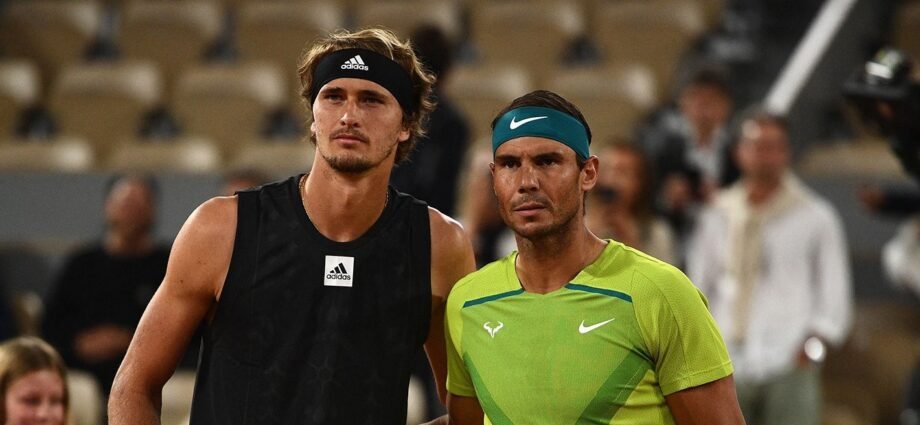As the official draw took place on Thursday night AEDT to learn the fate of 256 players across the men’s and women’s singles, there were gasps echoed amongst the room and around the world when it was announced that 14-time Roland Garros champion Rafael Nadal’s first opponent would be world No.4 Alexander Zverev.
Back in his prime with all due respect to Zverev, the Spaniard would have been considered a heavy favourite to triumph in a tournament that holds dear to his heart – cementing his legacy as one of the greatest ever to pick up a racquet.
However, that was then and this is now. Although the 37-year-old has shown glimpses of his best during his long-awaited comeback this year, the reality remains that he isn’t ready to compete in a best-of-five set match against the elite of Zverev’s calibre.
The final match during the day session on Court Philippe-Chatrier tomorrow will undoubtedly witness the most epic of atmospheres in what may well be Nadal’s last dance in a place that holds countless memories.
Two years ago, a devastating ankle injury sustained by Zverev midway through his semi-final against the king of clay left him pushed off the court in a wheelchair in tears of despair. Now, the German is in pole position to seek redemption.
But with the likely scenario that is Zverev coming out as a winner when the battle concludes – it will leave a bitter taste in the mouth of many Nadal fans and neutrals.
Back in October 2020, the former US Open finalist was accused of domestic abuse by his ex-girlfriend, Olga Sharyova, as those serious allegations have since been denied by Zverev claiming it’s “simply not true.”
Alleged acts of abuse included aggressively covering her face with a pillow, punching her in the face, and pushing her against a wall – the sort of actions that wouldn’t sit comfortably with the rest of society given the crackdown and increased awareness around domestic violence.
Signs of restlessness and frustration came to light at this year’s Australian Open when asked by journalists if it was appropriate for him to be involved in the ATP player’s council while the case is ongoing and whether he should be playing at all.
“(Some) journalists are saying that, some, who are actually interested more in his story to write about and more about the clicks than the actual truth,” Zverev told the press after his victory over Dominik Koepfer at Melbourne Park.
The old saying rings true that the accused is innocent until proven guilty – and Zverev deserves every opportunity to plead his innocence and is due a fair process before any definitive decision can be made.
That doesn’t mean the question isn’t allowed to be posed about whether Zverev should still be eligible to compete amidst the cloud of allegations that currently hover over him.
French Open tournament director and former world No.1, Amélie Mauresmo, spoke publicly about Zverev competing in the tournament in spite of the allegations in a bid to clear the air.
“So far, our policy is that, as long as the trial isn’t finished and there isn’t a decision, he’s (Zverev) considered innocent and so that’s why he’s allowed to be part of the draw,” Mauresmo explained. “And as far as the trial is concerned, we’re not going to comment on anything because the trial is happening, so we’re going to respect that.”
What message is it sending to young kids who idolise Zverev? What image is the ATP and French Open portraying? It certainly doesn’t come across as a healthy look for the sport’s brand.
In team sports such as football and basketball, often an accused athlete is stood down indefinitely until a ruling has been finalised depending on the severity of the claims, with the recent example in Australia being the betting scandal at Macarthur FC in the A-League where the club suspended down three players temporarily.
Tennis professionals who represent themselves however, seem to be somewhat dettached from the respective tennis governing bodies where everyone is at a crossroads as to what their role is to step in.
According to tennis journalist Ben Rothenberg, Zverev was handed a criminal penalty order for €450,000 by a Berlin Court due to enough sufficient evidence to suggest wrongdoing. Zverev is appealing the finding and is set for a date in court to contest on May 31st next week – in the middle of one of the biggest events of the tennis calendar.
There were times at Melbourne Park when it became obvious that the situation was delicate – going as far as the Australian Open social media team reluctant to mention Zverev’s name until it was impossible not to as he reached the semi-finals.
Whichever way you decide to spin it, there’s no escaping the fact that it’s a very awkward position for many involved to the point where you wonder how Zverev himself is coping with the added scrutiny and pressure. In January we saw glimpses of his rhythm being disrupted in the early stages of the Australian Open before finally finding his feet which could play into Nadal’s favour.
Only this time, Zverev admits that the domestic abuse trial won’t derail his quest for glory in Paris over the next fortnight.
“At the end of the day, I do believe in the German system,” he said.
“That’s why I can play calmly and I think my results have been showing it. Winning in Rome is a big title…and if it would be on my mind I wouldn’t be playing the way I am.”
Nonetheless, if it were to be Nadal’s final ever appearance at the French capital – there will always be the lingering controversy regarding if Zverev should even be on the other side of the net in the first place.
Follow Christian Montegan on X @monte_sports
Follow The Tennis Site on X @thetennissite

